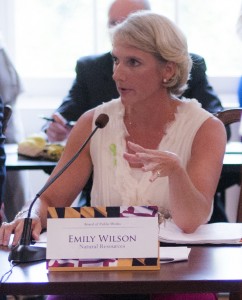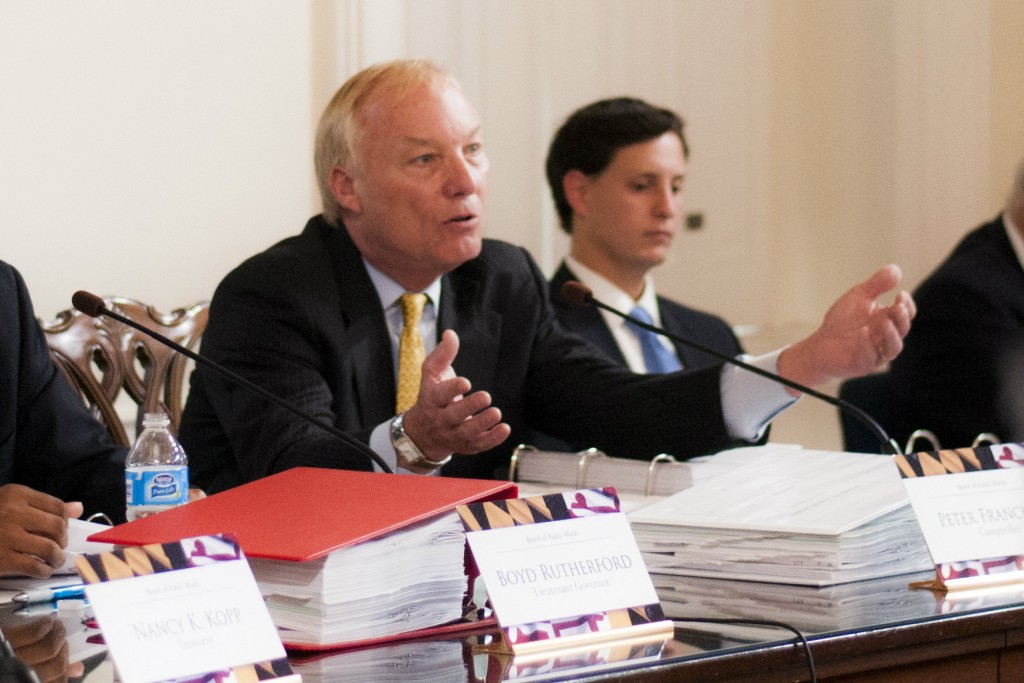Lt. governor scolds bureaucrats on spending for land, budget cushions
Lt. Gov. Boyd Rutherford chairs Board of Public Works with Comptroller Peter Franchot.
By Rebecca Lessner
for MarylandReporter.com
Lt. Gov. Boyd Rutherford came down hard on state department spending this Tuesday, as he covered for Gov. Larry Hogan at the first Board of Public works meeting since the governor announced he was starting treatment for cancer.
“It’s great to know everyone is not as cheap as I am, or as my mother would say, frugal,” said Rutherford. “I was one of those few government people who always felt I should spend less than the budget.”
Rutherford lectured the Department of Natural Resources about their high land bids, the Department of Juvenile Services and the Department of Human Services for unnecessary budget “cushioning” in the millions, and shot down the Board of Elections’ request for $1.8 million for an informational ballot-campaign.
Rutherford will be taking on added responsibility following an announcement by Hogan that he is starting an 18-week aggressive treatment plan for lymphoma. Rutherford, who was secretary of the Department of General Services in the Ehrlich administration, is no stranger to BPW meetings.
“I have concerns about the Department of Natural Resources in terms of their open space program because the whole idea of procurement is to have an arms length relationship,” Rutherford said, addressing two Program Open Space items on the agenda. “In most cases we are buying at the top range of appraisals.”
The two items on the agenda contained land parcels in Washington and Garrett Counties. Maryland law requires DNR to conduct two appraisals when acquiring land. On both of the land bids, the amount bid was closest to the highest appraisal.
Need for objective procurement
 Rutherford stressed the need for an objective procurement officer, someone able to distance himself or herself from “the passion of the purchase.”
Rutherford stressed the need for an objective procurement officer, someone able to distance himself or herself from “the passion of the purchase.”
“DNR is in the business of conserving land. All land looks great to you guys,” said Rutherford, arguing DNR doesn’t have an officer walking into a bid saying “I’ll pay this and not a penny more.”
However, DNR Director of Land Acquisition and Planning, Emily Wilson, defended DNR, stating they have been saving about $12.5 million through voluntary discounts.
Voluntary discounts are obtained when landowners favor DNR buying their land for preservation over the private sector buying land for development.
While conceding they do not always bid the lowest, Wilson pointed out that land goes through an evaluation process.
“Any property you see come before this body, has already gone through a rigorous review process,” said Wilson.
The process involves looking for red flags on the property, the impact of possible climate change, scoring it to an ecological assessment and analyzing where it is in relation to existing DNR lands.
“I guess I still feel there is not an objective look at it,” said Rutherford.
The lieutenant governor concluded the policy issue is one that will be addressed through possible, future legislation.
Cushioning budgets
Also under Rutherford’s scrutiny was the request for “cushioning” funds, from both the Department of Juvenile Services (DJS) and the Department of Human Resources.
DJS wished to spend $296 million to provide juvenile detention services through 32 different contractors, over multiple year contracts. Serving approximately 860 children in their facilities, that sum equaled paying out $346,000 per juvenile, while the state found that cost was over four times the amount actually needed.
The board decided to approve contracts for only one year, fiscal 2016, which is $60 million — the estimated cost of $52 million plus a cushion of $8 million.
“They (legislators) added a cushion, up to $60 million, but the money they appropriated for actual services was $52 million,” Franchot said.
Franchot questioned these large cushions.
“The reality is that we do contract for more capacity than we anticipate that we are going to need, so that we can have flexibility to meet all of the court orders at various levels of service,” said DJS Secretary Sam Abed.
After a lengthy chastising by the comptroller and lieutenant governor, the board chose to award Juvenile with $60 million from the general fund for a one-year term, with the assurance DJS will return to BPW in a week with re-negotiated contracts.
Board asks for shorter time periods between budget approvals
The Department of Human Resources, which oversees several foster care programs, was also under scrutiny for its budget request.
DHR requested $380 million dollars, to be spread out among 38 Child Placement Agencies over a three-year term.
However, BPW found the amount DHR would need to operate for only one year, specifically 2016, to be $88.3 million.
DHR Deputy Secretary for Operations Greg James said they cannot predict how many kids they will serve each year.
However, Comptroller Peter Franchot and Rutherford were not deterred.
“Now you’re asking for 30% more than what you have been asking for, an 30% seems high to me,” said Rutherford.
Rutherford motioned for DHR to return to next board meeting with a recommendation that limits the three-year contract terms to FY 2016 only.
“It symbolizes that we are running a tight ship,” said Franchot. “I think what you do is very important, I just want to tighten it up fiscally.”
Awareness program on new voting machines
Last on the chopping block was the State Board of Elections, which proposed spending $1.8 million on an outreach program to provide awareness of new voting machines, to be used for the first time in 2016.
“We just don’t want voters to be surprised when they arrive at their polling place,” said Sarah Hilton on behalf of the State Board of Elections.
“I guess I just think people are smart,” countered Rutherford, who argued voters were capable of understanding the new machines.
BPW voted the campaign was unnecessary and the $1.8 million was denied.

MarylandReporter.com is a daily news website produced by journalists committed to making state government as open, transparent, accountable and responsive as possible – in deed, not just in promise. We believe the people who pay for this government are entitled to have their money spent in an efficient and effective way, and that they are entitled to keep as much of their hard-earned dollars as they possibly can.

